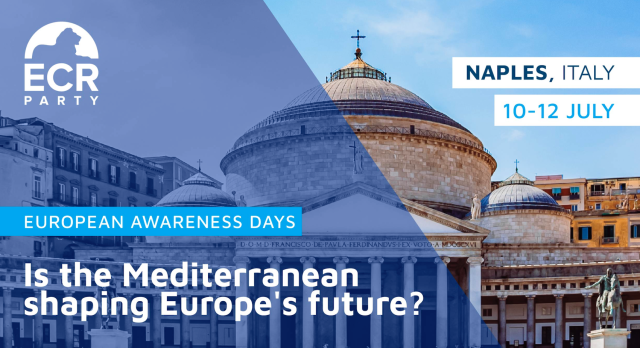
Conservative Values and Pragmatic Solutions Must Guide Europe’s Leadership in Ukraine’s Security, Sovereignty, and Reconstruction
As the war in Ukraine grinds on into its third year, the strategic stakes for Europe have never been higher. The conflict is no longer just a tragedy at Europe’s doorstep—it is a defining test of the continent’s geopolitical resilience, institutional credibility, and long-term security. The notion that “Ukraine’s future is Europe’s responsibility” is not grounded in romantic idealism, but in strategic necessity. The path forward must be guided by conservative values and pragmatic solutions—prioritizing security, preserving sovereignty, and planning reconstruction not just in physical terms, but as a model of democratic durability.
This central theme will be the focus of a pivotal panel discussion on the latest ECR Party initiative in Naples on July 12, bringing together policymakers, strategists, and thought leaders to explore Europe’s role in shaping the future of its eastern frontier. The conversation comes at a critical time, as Ukraine’s fate is increasingly intertwined with Europe’s stability. Decisions made today will resonate for decades, determining the strength and orientation of Europe’s borders, alliances, and core values.
Security First: The Strategic Imperative
At the heart of Europe’s responsibility is the recognition that Ukrainian security is inseparable from European security. A Ukraine left vulnerable is an invitation to further destabilization—not just for Kyiv, but for the broader region. Europe must adopt a clear-eyed approach: this is not a distant conflict, but one with immediate implications for NATO’s cohesion, the EU’s integrity, and the security architecture that has defined the post-Cold War era.
Conservative values emphasize order, defence of national sovereignty, and the preservation of institutions. These principles must underpin Europe’s security strategy toward Ukraine. Support should not be reactive or emotionally driven; it must be deliberate, sustained, and coordinated. This includes supplying defensive capabilities, providing intelligence and cyber support, and reinforcing Ukraine’s ability to deter future aggression. A stable eastern frontier is the only way to ensure a secure European heartland.
Sovereignty: The Cornerstone of Stability
Sovereignty is not an abstract ideal—it is the foundation of peace. For Ukraine to chart its own future, free from external coercion, it must be fully sovereign. Europe has a moral obligation to support this goal, but more importantly, a strategic interest in doing so. Allowing any ambiguity in Ukraine’s territorial integrity would embolden authoritarian regimes and undermine the international rule of law.
Sovereignty also demands political support. Europe must continue its efforts to integrate Ukraine more closely into Euro-Atlantic institutions. That does not mean rushing membership processes or diluting standards, but rather providing a clear roadmap, technical assistance, and political capital to strengthen Ukraine’s institutions. Supporting reforms, fighting corruption, and enhancing governance are pragmatic steps that contribute to both sovereignty and long-term resilience.
Reconstruction: Beyond Concrete, Toward Resilience
Rebuilding Ukraine is about more than bricks and mortar. It is about rebuilding lives, restoring trust in public services, and creating conditions for sustainable growth. The challenge is immense—estimates suggest that hundreds of billions will be needed. Yet money alone is not the answer. What is required is a conservative, strategic approach: investing in infrastructure that supports energy independence, digital modernization, and education. Projects should be chosen not for political symbolism, but for their capacity to restore self-reliance and regional stability.
Europe must lead this effort—not just as a donor, but as a strategic partner with a clear purpose. This means working closely with Ukrainian institutions, applying stringent oversight, and ensuring that reconstruction efforts do not breed dependency, but instead foster local capacity. Partnerships with the private sector and civil society must be prioritized, alongside transparent frameworks to avoid waste and corruption.
Clarity of Purpose, Unity of Action
The next Ecr event panel’s emphasis on “Conservative Values, Pragmatic Solutions” is more than a slogan—it is a call to action. Europe must lead with clarity of purpose. The path ahead is not about abstract ideals but about concrete strategy. A secure Ukraine is a sovereign Ukraine. And a sovereign Ukraine is a safer, stronger Europe.
Europe’s commitment must not waver with shifting political winds or media attention. This is a generational task, one that will shape the identity of the European project itself. Ukraine is not simply a neighbour in need; it is the proving ground for Europe’s will, its unity, and its values.



 Subscribe
Subscribe